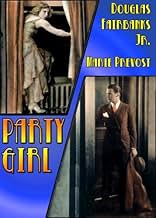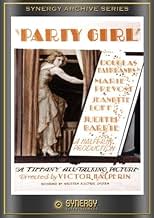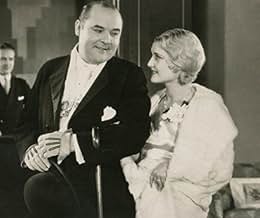Agrega una trama en tu idiomaA cautionary tale. Ellen's past as a "party girl" is carefully hidden but may be exposed when another party girl tricks her fiance into marriage.A cautionary tale. Ellen's past as a "party girl" is carefully hidden but may be exposed when another party girl tricks her fiance into marriage.A cautionary tale. Ellen's past as a "party girl" is carefully hidden but may be exposed when another party girl tricks her fiance into marriage.
- Dirección
- Guionistas
- Elenco
Earl Burtnett
- Orchestra Leader
- (as Earl Burtnett and His Biltmore Orchestra and Trio)
Eddie Bush
- Member of Biltmore Trio - Guitar
- (sin créditos)
Louise Carver
- Masseuse
- (sin créditos)
Paul Gibbons
- Member of Biltmore Trio - Steel Guitar
- (sin créditos)
Henry Roquemore
- Party Guest
- (sin créditos)
Opiniones destacadas
This lurid pre-coder is about the use of "party girls" in big business. The idea is that business men are wined and dined at wild parties where there are available girls.
Douglas Fairbanks, Jr. stars as a college boy who attends a party and is picked up by evil Leeda (Judith Barrie). Next morning she pretends she has been "wronged" and what's he gonna do about it? The sap marries her only to discover that she wants a business deal for her real boy friend in order to Fairbanks to divorce her. What a tramp! His dad's secretary (Jeanette Loff, who sings a couple songs), a reformed "party girl," is heartbroken and so returns to the party circuit only to get caught in a police raid.
This is a pretty racy film even for 1930. There's once scene where the girls fill a fountain with perfume and then the guys grab Marie Prevost (who does NOT get billing in this film for some reason), strip here and bathe her in the fountain while everyone watches.
The acting is just awful, with Fairbanks and Barrie turning in hideous performances, but the film is so suggestive and trampy, it's impossible not to watch.
John St. Polis the father, Almeda Fowler (don't call me madam!) is the madam, Louise Carver is the masseuse, and Lucien Prival is Newcast.
On the plus side, the music is quite good, and there that freight elevator that keeps delivering cars into the party living room!
Douglas Fairbanks, Jr. stars as a college boy who attends a party and is picked up by evil Leeda (Judith Barrie). Next morning she pretends she has been "wronged" and what's he gonna do about it? The sap marries her only to discover that she wants a business deal for her real boy friend in order to Fairbanks to divorce her. What a tramp! His dad's secretary (Jeanette Loff, who sings a couple songs), a reformed "party girl," is heartbroken and so returns to the party circuit only to get caught in a police raid.
This is a pretty racy film even for 1930. There's once scene where the girls fill a fountain with perfume and then the guys grab Marie Prevost (who does NOT get billing in this film for some reason), strip here and bathe her in the fountain while everyone watches.
The acting is just awful, with Fairbanks and Barrie turning in hideous performances, but the film is so suggestive and trampy, it's impossible not to watch.
John St. Polis the father, Almeda Fowler (don't call me madam!) is the madam, Louise Carver is the masseuse, and Lucien Prival is Newcast.
On the plus side, the music is quite good, and there that freight elevator that keeps delivering cars into the party living room!
Wild Women! Bootleg hooch! Hot jazz! Sequins and furs! Blackmail! Suicide! This pre-Code cautionary tale opens with a typical disclaimer stating "It is our earnest hope that this film may arouse you..." Of course, they mean arouse your indignation to help eliminate such vices as you view in this exposé. Or, do they?
Pleasant juvenile Douglas Fairbanks, Jr., headlines along with a bevy of largely talent-free "party girls". Judith Barrie has some especially embarrassing scenes, leading one to wonder whether she may have gotten her part by being a party girl. Almeda Fowler, making her film debut as Maude "Don't call me Madam" Lindsay, and veteran actor John St. Polis put in decent performances adding some humor. The well regarded Earl Burtnett and His Hotel Biltmore Orchestra from Los Angeles provides suitable jazz accompaniment.
The best scene is the party where guests arrive in their automobiles via a service elevator directly to the party. The much commented upon perfumed fountain scene seems to have been excised from the version available from Alpha Video. Altogether, this is a pleasant diversion that pushes the envelope even for pre-Code Hollywood.
Pleasant juvenile Douglas Fairbanks, Jr., headlines along with a bevy of largely talent-free "party girls". Judith Barrie has some especially embarrassing scenes, leading one to wonder whether she may have gotten her part by being a party girl. Almeda Fowler, making her film debut as Maude "Don't call me Madam" Lindsay, and veteran actor John St. Polis put in decent performances adding some humor. The well regarded Earl Burtnett and His Hotel Biltmore Orchestra from Los Angeles provides suitable jazz accompaniment.
The best scene is the party where guests arrive in their automobiles via a service elevator directly to the party. The much commented upon perfumed fountain scene seems to have been excised from the version available from Alpha Video. Altogether, this is a pleasant diversion that pushes the envelope even for pre-Code Hollywood.
Dear Me! What a creaky talkie social shocker! Made really in 1929 with absolutely the most primitive sound recording, PARTY GIRL has all those Singin In The Rain sound recording problems (and solutions) evident: like the mic in the vase of flowers or on someone's shoulder or in a lampshade. Often one only one actor in a scene can be heard, or they turn their head out of range etc...all very funny etc. BUT this is otherwise a well staged sex expose made by the never heard of PERSONALITY PICTURES who really sound like a chorus girl racket itself. The film itself is a social morality play about a chorus girl racket and their high rise bed hopping antics ruining young mens lives and contorting business contracts from rightful owners. It also has all those great cliche scenes of tubby old fellers in tuxedos manhandling squealing 18 year old flappers at gin parties at the office. A good scene is a party in a wharehouse where guests actually drive into the goods lift and right up to the 11th floor and zoom directly into the room. Douglas Farbanks Jr is the handsome misled hero bedded by a floozie schemed by her conniving mother! The furniture and clothes alone are enough to watch this genuinely thoroughly modern 20s adult drama. I bought a dvd of this film for $5 in Sydney last week and the quality is quite good.
If you want to study good acting, this film is essential for, well, the flip side of the acting craft. The most basic line readings are spectacularly awful. My personal favorite: a woman, facing two policemen with overbearing warnings, saying, "so - long pause - what?" To be fair, though, the script, just the basic dialogue, is horrible and the plot is just the bare bones material for an audience to get a peek at a lurid world of 'party girls' and Prohibition-era 'gin parties.' The double-meanings are just a step more lurid than the thinly-veiled plots of other "A" pictures. While prostitution is the main theme, the look into how the rich flaunt the alcohol ban is sure to have titillated an audience of the era. The 'perfume' bath given to one of the girls is strongly suggested to be gin. And one cop notes before questioning a girl that the guilty go for a bottle before being interrogated. The class depictions in a film shot at the onset of the Depression also are stark. The rich drink and carouse with poor girls on the margins of society who, as the opening title says, want only to earn a living in a "decent" way. The message to women is clear enough: the workplace is no place for decent gals.
Party Girl (1930)
** (out of 4)
Jay Rountree (Douglas Fairbanks, Jr.) is the son of a wealthy banker who spends most of his time borrowing money from dad so that he and his friends can drink and have a good time. Jay ends up at a party and meets Leeda (Judith Barrie) and the next morning she cries that he "ruined" her good girl quality so the weak Jay marries her with no questions asked. This here breaks his heart because he wanted to marry his dad's secretary (Jeanette Loff) but before long he realizes that Leeda is a prostitute who is used at business parties to lure suckers.
Victor Halperin would make a name for himself two years from this film when he directed the Bela Lugosi film WHITE ZOMBIE so it's interesting getting to see something earlier. This film here starts off like a lot of the exploitation pictures of the era with a "warning" telling people that a party girl is a prostitute who tries to get her nails into men and ruin their lives with various scams. I did find it funny that this was warning people against these leech hookers yet they never bothered to tell men to just stay away from them!
With that said, I must admit that I was really shocked to see Fairbanks, Jr. in this role. This was obviously done when he was a struggling actor but it's still strange to see a name like his attached to what's basically a very low-budget exploitation movie. What's even more shocking is that he managed to go on and become a fine actor because his performance here is quite awful. Just check out the scenes where he's pouting about having to get married. Yikes. Loff isn't much better as the prostitute but Barie is good in her small role.
PARTY GIRL is certainly worth watching if you're a fan of exploitation movies or if you want to see an early film from Fairbanks where he's not all that good. Overall the film runs just over a hour so it's decent enough to make it worth watching.
** (out of 4)
Jay Rountree (Douglas Fairbanks, Jr.) is the son of a wealthy banker who spends most of his time borrowing money from dad so that he and his friends can drink and have a good time. Jay ends up at a party and meets Leeda (Judith Barrie) and the next morning she cries that he "ruined" her good girl quality so the weak Jay marries her with no questions asked. This here breaks his heart because he wanted to marry his dad's secretary (Jeanette Loff) but before long he realizes that Leeda is a prostitute who is used at business parties to lure suckers.
Victor Halperin would make a name for himself two years from this film when he directed the Bela Lugosi film WHITE ZOMBIE so it's interesting getting to see something earlier. This film here starts off like a lot of the exploitation pictures of the era with a "warning" telling people that a party girl is a prostitute who tries to get her nails into men and ruin their lives with various scams. I did find it funny that this was warning people against these leech hookers yet they never bothered to tell men to just stay away from them!
With that said, I must admit that I was really shocked to see Fairbanks, Jr. in this role. This was obviously done when he was a struggling actor but it's still strange to see a name like his attached to what's basically a very low-budget exploitation movie. What's even more shocking is that he managed to go on and become a fine actor because his performance here is quite awful. Just check out the scenes where he's pouting about having to get married. Yikes. Loff isn't much better as the prostitute but Barie is good in her small role.
PARTY GIRL is certainly worth watching if you're a fan of exploitation movies or if you want to see an early film from Fairbanks where he's not all that good. Overall the film runs just over a hour so it's decent enough to make it worth watching.
¿Sabías que…?
- TriviaThe film holds the record for longest UK film ban. The BBFC banned the film in 1930. It was finally released, with a PG rating, in 2003.
- Citas
Diana Hoster: [answering phone from a massage table, butt-naked--literally; this is pre-code] Di Hoster speaking, in the flesh.
- ConexionesFeatured in Hollywood Uncensored (1987)
- Bandas sonorasOh! How I Adore You
Words and Music by Harry Stoddard and Marcy Klauber
Copyright 1930 by Shapiro, Bernstein & Co
Selecciones populares
Inicia sesión para calificar y agrega a la lista de videos para obtener recomendaciones personalizadas
Detalles
- Tiempo de ejecución
- 1h 7min(67 min)
- Color
- Relación de aspecto
- 1.37 : 1
Contribuir a esta página
Sugiere una edición o agrega el contenido que falta





















